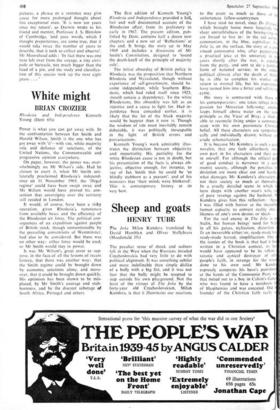White might
BRIAN CROZIER
Rhodesia and Independence Kenneth Young (Dent 65s)
Power is what you can get away with. In the confrontation between Ian Smith and Harold Wilson, Smith is the one who has got away with `it'—with um, white majority rule and defiance of sanctions, of the United Nations, the Commonwealth and progressive opinion everywhere.
On paper, however, the power was over- whelmingly on Mr Wilson's side. Had he chosen to exert it, when Mr Smith uni- laterally proclaimed Rhodesia's independ- ence on 11 November 1965, the 'illegal regime' could have been swept away and Mr Wilson would have proved his con- tention that sovereignty over the territory still resided in London.
It would, of course, have been a risky operation, giVen Rhodesia's remoteness from available bases and the efficiency of the Rhodesian air force. The political con- sequences of an expedition against people of British stock, though unmentionable by the prevailing conventions of Westminster, had also to be considered. But there was no other way: either force would be used, or Mr Smith would stay in power.
It was Mr Wilson's great error to sup- pose, in the face, of all the lessons of recent history, that there was another way: that the Smith regime could be brought down by economic sanctions alone, and more- over, that it could be brought down quickly. His optimism has been shown to be mis- placed, by Mr Smith's courage and stub- bornness, and by the discreet sabotage of South Africa, Portugal and others. The first edition of Kenneth Young's Rhodesia and Independence provided a full, fair and well documented account of the Rhodesian affair, from its prehistory to early in 1967. The present edition, pub- lished by Dent, contains half a dozen new chapters and a new set of 'Reflections' at the end. It brings the story up to May 1969 and includes a discussion of Mr Smith's Constitution, designed to 'sound the death-knell of the principle of majority rule'.
The initial absurdity of British policy in Rhodesia was the proposition that Northern Rhodesia and Nyasaland, though without experience of self-government, should be- come independent, while Southern Rho- desia, which had ruled itself since 1923, should remain a dependency. To the white Rhodesians, this absurdity was felt as an injustice and a cause to fight for. Had in- pendence been conceded earlier, it is likely that the lot of the black majority would be happier than it now is. Though the wisdom of UDI must inevitably remain debatable, it was politically inescapable in the light of British errors and prevarications.
Kenneth Young's work admirably illus- trates the distinction between objectivity and impartiality. His partiality for the white Rhodesian cause is not in doubt, but his presentation of the facts is always ob- jective, objective enough, for instance, to say of Ian Smith that he could be 'as blindly stubborn as a peasant', and of his ministers that 'their minds were blinkered'. This is contemporary history at its very best.






































 Previous page
Previous page